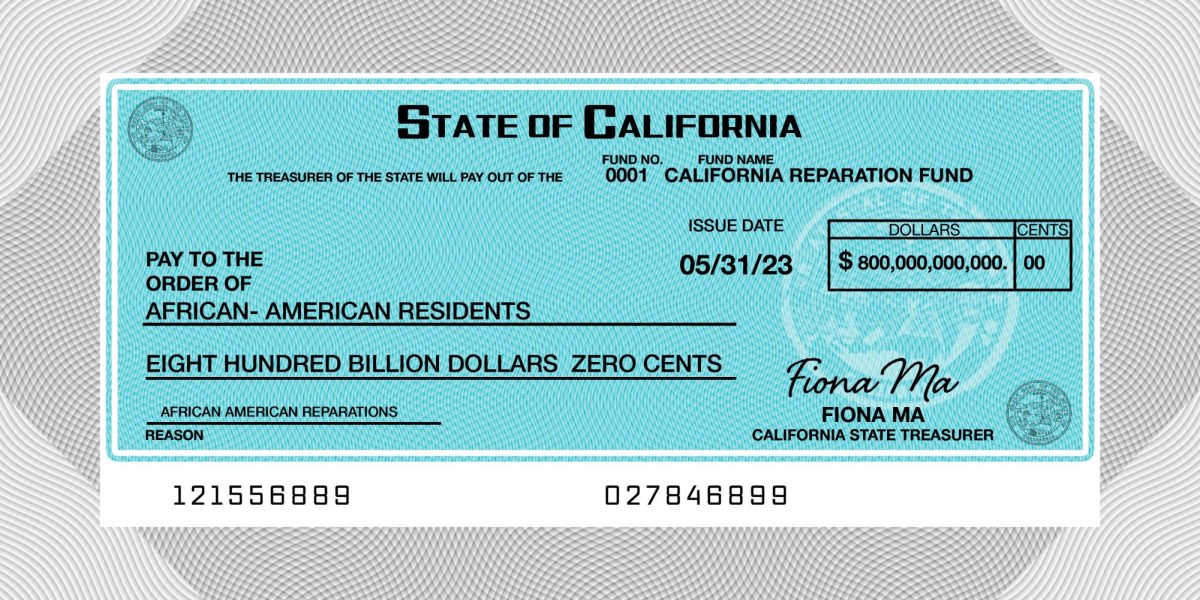In the depths of America’s unfinished business with racial injustice, it’s time to confront an undeniable truth: Reparations for Black people are not a mere option but an urgent and unavoidable necessity.
Reparations can be defined as compensation for historical injustices, providing acknowledgement, redress and equity for those impacted by systemic oppression such as slavery and segregation. They aim to rectify the past and promote a fairer society.
In the context of the Black community, reparations serve as a critical step in addressing historical and ongoing injustices inflicted upon Black people. They provide an opportunity to heal deep wounds and rectify the systemic harm that continues to plague the Black community.
This means that for African Americans, reparations are a way to challenge the effects of what has already been done and what is still being done to harm them.
For people in California, this would mean providing more adequate housing, jobs and more funding for proper education systems and aid programs for African Americans.
It is imperative that people recognize reparations as a means to level the playing field between Black people and white people, rather than dismissing them as mere gestures.
Often, African American reparations are looked at through the lens of just slavery. However, in order to fully understand how momentous and impactful these reparations would be, they must be looked at through the lens of all racism that has been and is being experienced by African Americans within the United States. To say that slavery is the only atrocity that this country should be held accountable for is to dismiss all of the racism that was experienced after it.
For example, look at more modern manifestations of racism, like the War on Drugs and police brutality. The War on Drugs was used by ex-president Richard Nixon and the presidents after him, particularly Ronald Reagan, to wrongfully incarcerate African American men. Both Nixon and Reagan had a clear goal in mind when combating the usage of drugs in the United States: to put African Americans in a position of even deeper oppression.
The War on Drugs targeted poorer communities, leaving African Americans and Latinos as some of the most affected. Police officers primarily worked within poor communities, primarily Black and brown communities, arresting people within them for cheaper drugs over expensive ones despite their undoubtable similarities, such as crack versus cocaine.
As a result of these arrests, many African Americans were left to suffer, not just the people incarcerated. This not only affected those in jail for drugs because they were forced to do unpaid labor, but it also greatly affected the lives of the kids whose parents were incarcerated.
The War on Drugs heavily demonized many minority groups, especially Black men. It deemed them as criminals, drug dealers and violent people. These stereotypes are dangerous to the lives of African American men when it comes to police. Often, when police see a Black man, their immediate instinct is to be violent, or to shoot without assessing the situation. Data shows that Black people are at a disproportionate disadvantage when faced by police, with them being 2.8 percent more likely to be killed by police officers.
In California, disparities are no less evident, with Black people being three times more likely to be seriously injured or killed by police. These statistics are not old, and this system continues to apply today in California. Impoverished African Americans are still a huge target for violence from the government.
The entire system of racism that California and the entire United States is built on, is one that has led to many patterns of violence towards African American people.
Reparations are not a new topic. They have been discussed for decades by many Black organizations, including the Student Nonviolent Coordinating Committee and the Black Panther Party during the 1960s, and to this day they are supported by organizations like the NAACP.
In California, efforts are underway to address the issue of reparations for African Americans. The Reparations Task Force of California has proposed a significant sum of 800 billion dollars for reparations specifically targeted towards African Americans. The task force strongly recommends this allocation and the matter will be further discussed, but the final decision lies with the state. It is clear that reparations are not just a mere desire for African Americans; they are deemed necessary.




Tim • Oct 25, 2023 at 9:24 am
Another pack of cow dung. They’ll let you post anything on the Internet. Death by cop story is bull. War on drugs… Yes bad deal but bad for all. This type of policy and approach is bad for all period. It creates more resentments down the line and it can’t be justified. Paying someone for mistakes in policy or 100 years old heals nothing. To late and too little, come up with something that deals with the here and now.